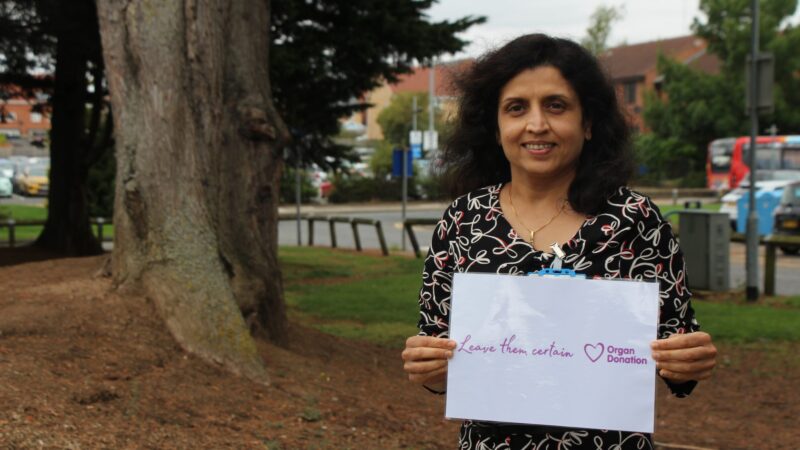
“Please discuss organ donation with your loved ones and leave them certain.” That’s the plea from a leading clinical expert on organ donation to the local population.
There is no doubt about it, discussing your personal decision about donating organs is not an easy conversation.
Organ Donation Week begins on Monday 26 September and runs until Sunday 2 October.
As the week approaches, our organ donation clinical lead is offering advice on raising the issue with loved ones.
Dr. Tara Mane said: “It’s vital that adults lets their loved ones know about their personal decision about organ donation.
“Even though the law now presumes consent that everyone is on the organ donor register, unless they opt out, permission from your next of kin is still required.
“While there may never be a good time to consider donation, there is definitely a worst time and that is in a hospital’s relatives’ room, dealing with the shock of a death and then being asked about donation.
“Should that day come, your relatives need to know if you want to be a donor.”
Tara’s advice for discussing organ donation
- Be aware of the facts – the organ donation website has all the information you need.
- If you feel awkward raising it, look for an opportunity based on something you have seen on the news or social media as a way to raise the subject.
- Relax – don’t rush this important conversation.
- Start gently – no one who loves you wants to have this conversation and it’s difficult for them as well.
- Explain how you feel – ask your loved one to think ‘what if I needed an organ?’
- Speak from the heart!
- Involve the wider family.
- Consider seeking guidance as some people find it helpful to speak with a faith leader or trusted advisor.
- Make the time for the conversation, take a breath and go for it.
- Register your decision on the organ donation website.
Tara continued: “By taking a little time now to have this conversation, you will be sparing those you love from one more worry as they deal the worst time of their life.
“Please discuss organ donation with your loved ones and leave them certain.”
Organ donation in numbers
- More than 50,000 people are alive today across the UK because someone said ‘yes’ to organ donation.
- 7,000 is the number of people that are seriously ill and in need of an organ transplant to save or transform their lives.
- Over 2021/22, 4,324 patients’ lives were saved or improved by an organ transplant.
More information
To find out more and register your decision, visit the NHS Organ Donor Register and share your decision with your family. Users of the NHS app, can also use this to record, check or amend their details or decision.
The law around organ donation changed in England in May 2020 and all adults are now considered as having agreed to donate their own organs when they die, unless they record a decision not to donate, are in one of the excluded groups or have told their family that they don’t want to donate.
However, relatives will still always be consulted before donation goes ahead. And each year, opportunities for transplants are missed because families aren’t sure what to do.
How to have the conversation about organ donation
Your family will always be involved if organ donation is a possibility so it’s important to discuss your decision.
Do you and your family know what each other would want?
Here’s some tips for having the conversation with loved ones.
1. Get the facts. Read up about organ donation on our website before you start.
2. Find a talking point. Try talking about something you’ve seen on the news or social media if it helps to get things started.
3. Relax. Have a chat while you’re spending time together over a cup of tea or on a walk.
4. Start gently. Let them know you’ve been thinking about organ donation and ask what they know.
5. Help everyone engage. Use questions like ‘What if I needed an organ transplant?’ to help explore how people feel.
6. Speak from the heart. Be honest and open and listen to each other – you don’t have to agree!
7. Involve the whole family. Encourage everyone in the family to find their voice. Even the young ones will have a view.
8. Seek guidance. Faith and culture can play a big part in how people feel about organ donation. Speak with your faith leader if this might be helpful for you.
9. Go for it! If you’re always promising yourself that you’ll bring it up another time… well, now is the time!
10. Find out more and record your decision. Once you’ve made a decision, get it on the NHS Organ Donor Register!